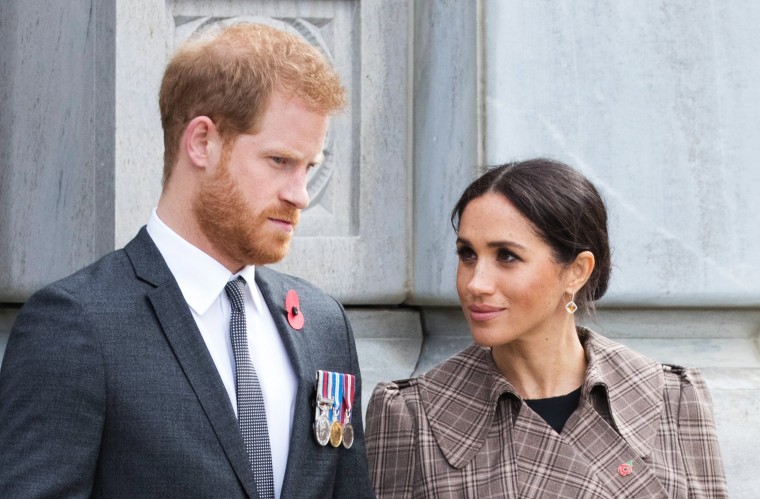Prince Harry and Meghan have once again broken new ground for the royal family, this time by urging the British Commonwealth to honestly grapple with its colonial past. Sadly, if predictably, the long-overdue move was greeted by many Brits with scorn and criticism.
The blowback against this most basic recognition of the realities of the past — Harry said, “There is no way that we can move forward unless we acknowledge the past,” while Meghan noted, “We're going to have to be a little uncomfortable right now because it's only in pushing through that discomfort that we get to the other side”—shows just how far the U.K. has to go to begin to right its historic wrongs.
It’s commendable that Harry and Meghan were willing to risk the ire of the tabloids to speak honestly about Britain’s wrongdoing towards people of color.
It’s commendable that Harry and Meghan were willing to risk the ire of the tabloids to speak honestly about Britain’s wrongdoing toward people of color in a way that most other royals are not, particularly after Meghan’s own poor treatment due to her background. But it will take much more than the Duke and Duchess of Sussex speaking out for the country to have the dialogue — and make the changes — it needs.
Britain’s historic actions have started to be scrutinized more intensely amid the U.K.’s recent Black Lives Matter protests, which sparked a domestic debate about the commemoration of colonial figures. Protesters’ removal in June of the statue of Edward Colston, a slave trader who donated large sums of money to charitable causes in Bristol, shows there is a strong appetite for open dialogue around colonialism.
For real progress, however, this dialogue must start much earlier and be more comprehensive. The only way to do that effectively is through the schools. Going forward, all British children must be taught unblinkingly about the devastation and hardship caused by the British Empire, particularly to nonwhite societies, rather than be schooled in a mythologized past of glory and beneficence.
When I attended high school in the U.K. from 1995 to 1999, few history classes even mentioned the British Empire's colonization of Africa. When they did, I was told that the empire should be a source of pride — that it was hugely successful because it led to incredible innovations in health care, transportation and manufacturing, and that we were still reaping the benefits of that success. I don’t remember any discussion about what it meant for the people living under colonial rule or how it shaped their futures.
As a British citizen of Nigerian descent, I was desperate for a more thorough education in the historic connections between the country in which I was born and the country in which I was raised. During Britain’s colonization of Nigeria, which began by taking over the city of Lagos in 1861, a divide-and-rule policy was implemented to keep Nigerian groups separate from one another to prevent any unified opposition to British authority, leading to tensions between different regions, but that was never covered in my class rooms.
Of course, Nigeria was only one of dozens of places permanently scarred by the British presence. Many atrocities took place during the colonial era, ranging from medical experimentation on slaves in 18th-century Caribbean colonies to colonial mismanagement contributing to the 3 million deaths in India’s 1943 Bengal famine. Elsewhere in Africa, a militia recruited by the British in the 1950s was responsible for the murder and torture of thousands of Kenyans during the Mau Mau uprising.
The list goes on, but despite this sordid record, 59 percent of British adults surveyed in 2016 claimed to feel pride rather than shame over the British Empire. Some 49 percent versus 15 percent think it left the places colonized better off, and a third would like it to still exist. This widespread sentiment reflects the fact that colonialism is not being adequately taught in schools, leaving many Britons in the dark about the horrific incidents for which their country was responsible.
The national school curriculum only lightly touches on the dark side of the British Empire. It should be adapted to include colonialism as part of a wider focus on Black British history. Young people are leading calls to mandate this change, and they have set up endeavors such as the Black Curriculum, to propel them.
The Black Curriculum’s work has driven home the fact that little has changed since my own school days. The government must ensure these young people’s voices are heard; their demands are entirely reasonable and should be implemented in full.
Of course, history education is just the first step. It’s important that people also understand that colonialism isn’t just a relic of the past. Its impact is still keenly felt in communities of color. In England and Wales, for example, Black people are nearly 10 times more likely to be stopped and searched by the police than white people. Black people are considerably more likely to live in substandard housing, which often has a knock-on effect on health.
History education is just the first step. It’s important that people also understand that colonialism isn’t just a relic of the past.
Unfortunately, this treatment will continue unless the government commits to being open about its historic transgressions. Simply pretending that imperial atrocities have had no bearing on our current situation is unacceptable.
The prime minister, Boris Johnson, says Britain is not a racist country, but many of its Black residents know otherwise. Engaging in meaningful dialogue with us and teaching our history to everyone won’t make up for the historic wrongdoing, but it can lead to a future where black Britons feel their lives and achievements matter as much as politicians say they do.


